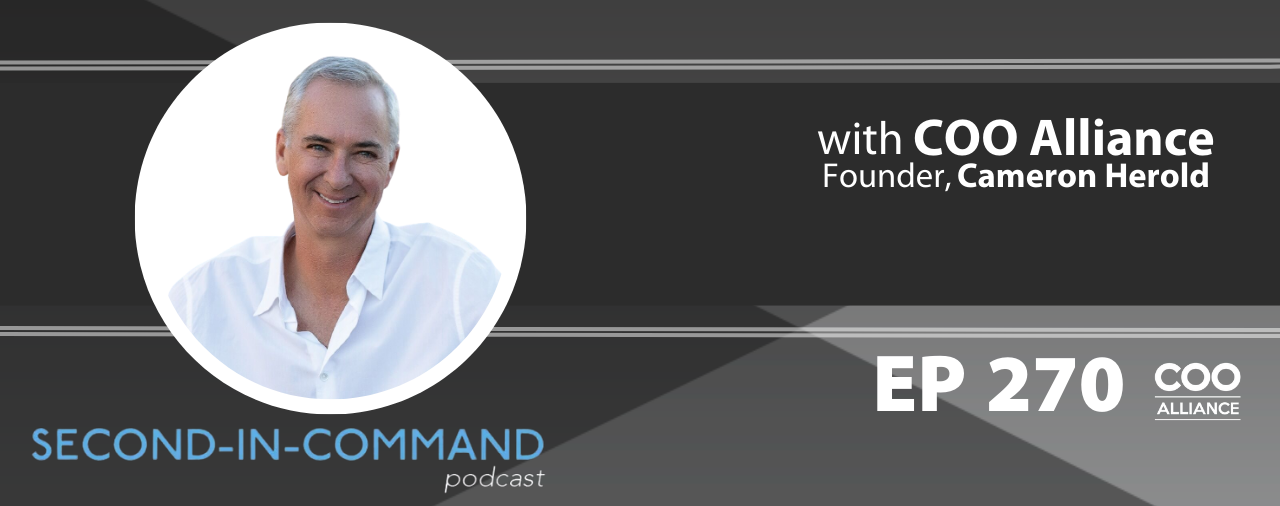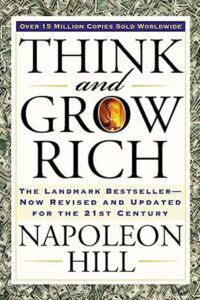Every entrepreneur has a to-do list, and for most of us, it’s quite long. However, as part of that list you probably have a top 5 list, the most important tasks to complete each day. If you’re like most of us, many of those vital tasks are ones that drain your energy. In today’s episode, Cameron shares a system that’s easy to implement, but also incredibly impactful. In fact, it helped Cameron and his team build 1-800-Got-Junk. He’ll show you ho to finally deal with those tasks you’re not so good at. He’ll also discuss the core skills for delegating projects and tasks, so that they get done on time and on budget, and that allow you to get the results you need.
In This Episode You’ll Learn:
- The “Top 5” system, first seen in Napolean Hill’s book “Think and Grow Rich.”
- Why you shouldn’t start your morning by checking emails, working on random projects, or making calls.
- Why, when an employee comes to you and says they’ll get it done by Friday, they really won’t.
Resources:
Connect with Cameron: Website | LinkedIn
Get Cameron’s latest book: The Second in Command – Unleash the Power of Your COO
Subscribe to our YouTube channel – Second in Command Podcast on YouTube
Get Cameron’s online course: Invest In Your Leaders
—
You have a to-do list, right? You have a top-five list. In this episode, I’m going to share one of the easiest-to-implement systems, yet probably the most impactful that helped us build 1-800-GOT-JUNK. We are going to dive into how to finally start getting that stuff you suck at or that drains you of energy off your plate. We are going to dive into the core skills of how to delegate projects and tasks so that they get done on time, on budget, and so that you get back the result that you are hoping for when you delegate them. I can’t wait to read your comments on this episode.
—
I learned about something called the top five. This is something I learned from the book of Napoleon Hill’s Think and Grow Rich. It was a story about Charles Schwab and Ivy Lee. It was originally like six or a half dozen. The basic story goes like this. There was this management consultant, Charles Schwab. He went and cold-called the CEO of the steel company and he said, “With my systems, you will know how to manage better.” Lee said, “I don’t need to know how to manage better. I need to do the stuff I already know to do. I need to get more done of what I should be doing.” He said, “I will give you a system, and if you try this system for 6 weeks and after you do it for 6 weeks, send me a check for what you think it was worth.”
The system was this, at the end of every day, make a list of the top five things you have to do for tomorrow. Just sit down, spend time, and limit not 12, not 64, not 3, what are the top 5 things you have to do tomorrow? Put them in order of impact, from the highest impact to the lowest impact. Now you have got your top five. When you wake up in the morning, go about your normal routine. When you start working, don’t check your email, and don’t start working on random projects. Don’t do any calls. Start working on project one. When you finish item 1, start working on item 2. Don’t work on the rest of your business until you get through your must-do list.
Charles Schwab had all of his employees do it. They did it for six weeks. He then sent Ivy Lee a check for $25,000. That was many years ago. $25,000 for that system many years ago was worth millions now. At the time, it turned Charles Schwab into a name that we all know. It also turned him into the wealthiest steel producer in the world. It was that simple top-five list. We rolled that out at 1-800-GOT-JUNK? and had all of our employees doing it. It was massive and I still use that now.
In Good to Great, Jim Collins talks about his stop-doing list. I call it my crap F list. I have my bucket list and I have my F it list. The bucket list is all the stuff I want to do before I die. The F it list is all the stuff that, “Life’s too short. F it, I’m not doing it anymore.” Do you know what’s on my F it list? Drinking wine on planes. I only fly first class, but they serve crappy wine on planes.
I would never buy that wine at home. Why would I ever drink it on a plane? Great, give me a glass of a $4 bottle of red when I only buy $100 bottles at home. It doesn’t make any sense. I’m not doing it or I’m not checking my email or I’m not replying to my DMs in social media except on Instagram because I like Instagram. You start looking at the stuff that isn’t worth your time doing or drains you of energy.
I will give you a good system to help you with this. Pretend that someone follows you around with a video camera for a month, and then you get to watch the video, and you watch everything that you do at work. Open emails, reply to emails, book flights, meet with teams, coach people, talk to clients, prep for events, prep for speaking events, and look at your slides. You might have 80 things on your list of things that you do every month.
What I do is I open a spreadsheet and I write down every single task in column A. I might have 80 rows of all the things that I do. In column B, I categorize them all in 1 of 4 ways. By the way, apologies to the kids as I’m swearing. As Vision said, “For Christ’s sake, it’s 2022.” I also do apologize because maybe you don’t need to know I’m swearing. Categorize all the tasks in 1 of 4 ways. I for Incompetent, C for Competent, E for Excellent, and U for Unique ability. This is the system that Dan Sullivan teaches at Strategic Coach.
The incompetent means you suck at it. Competent means you are okay at it. The excellent means you are good at it but you don’t love doing it. The unique ability is the stuff that you love doing, you are good at, and you get energized while you are doing it. You would do it for free except your kids have to eat. In column C, for each task, you write down a dollar value. If you were paying someone to do that task every day, all day. Let’s say the task was to clean toilets, what would the hourly rate be? What would the hourly rate be for booking hotel rooms, doing slides, or coaching someone? Put an hourly rate down for all those things.
What you want to start doing is getting stuff off your list or putting it onto your stop-doing list anything that’s below your hourly rate. I get paid $4,600 an hour to coach CEOs. That’s why I say I coach real companies. $4,600 an hour is my effective hourly rate. I get paid $10,000 for a 1-hour Zoom, $15,000 for a 1-hour Zoom, or $40,000 for in-person speaking. I know my value is somewhere between $4,000 an hour. I can’t even say $40,000 because then you have to travel for that. Somewhere between $4,000 and $15,000 an hour is my hourly rate.
My hourly rate, why am I doing jobs that are $20, $50, or $100 an hour jobs? If I could get paid $4,000 to coach someone, I should delegate everything except genius and just spend a couple of hours cold-calling to land a couple more coaching clients or find somebody who can go cold-call to coach. The more you can get off your list so that all you do is work in your zone of genius, your unique ability, the more you win.
I had to learn that because I was always that radically self-reliant, “I can do this myself. It’s just faster to do it.” Sometimes it’s faster to do it yourself, but sometimes it’s better to hire someone, coach someone, or train someone to do it for you. I learned about the 80% rule. This is not the Pareto principle. This is not that 80% of your results come from 20% of your efforts. This is that stuff can always be a little bit more perfect.
If you had seen my transcript from the university, you would never have allowed me to come up on this stage. It’s terrible. I got a 2.2 GPA. I had 63% because I was running a business, I was president of a fraternity, I was on the ski team, and I didn’t go to classes. Who got straight As in school? Do you know that no one has looked at your transcript since you graduated? Sorry to break it to you. They didn’t matter. We were all lied to. The straight As didn’t matter.
What mattered was getting educated for yourself for the sake of learning more. Not to have a transcript that no one’s ever going to look at again. What I learned is that most people are okay with a solid B. Most people are okay with a solid 80%. What I try to do is get stuff done and get it out the door as quickly as possible, and then maybe pass the part that could be improved to an expert who can improve it quickly.
I will show you how this works. I’m a bad writer. I’m a horrible writer. When I write something, I can piss people off with a happy birthday email. It comes off as too short and like, “Why don’t you care?” I’m like, “I said happy birthday.” Yeah, but that was it. I’m like, “F, I’m busy.” Now, you are swearing at me. I learned that I shouldn’t write emails out to my tribe, my clients, or my franchise partners, but I had an idea of what I wanted to say.
My 80% was to do a transcription. I would record it. This was back in the day when it was Dragon Dictation. Now, you have got Siri, Otter, or whatever you want to use. I would do a transcription, I send it to my assistant, and she types it up and makes it better. She takes my 80%, which is verbal or transcribed, she can polish it, and she can take that part that was 20%. She can get it quickly. In 15 minutes, she can polish my email and get it to 96% perfect.
If I’m going to send it out to millions of people like Mindvalley, Vision could do his verbally, somebody could edit it for him, and then he will send it to a copywriter or a communication specialist and they make it pop off the page. They take that 4% and they polish it to 80% in a half an hour. Now, it’s 99.2% perfect. That’s pretty amazing because we are not flying planes. There’s no surgery. Perfect slows everything down. How can you quickly have a bunch of experts that you can pass things to and do it in 30 minutes?
Now, that memo that used to take me 6 days, takes me 5 minutes, takes my assistant 15 minutes, and takes a copywriter 30, and everybody is thrilled. If you can remove the time in between each of those stages, your stuff is getting out the door faster and momentum is creating momentum because of that 80% result. I had to learn to outsource.
This is becoming more obvious, but I have been outsourcing now for several years. I just got a note the other day from one of my former assistants who’s based in the Philippines. She was an assistant of mine several years ago. The Philippines to Vancouver was amazing for time zones. I would work from 8:00 until 5:00 during the day in Vancouver, delegating tasks to her. We could sync up over Skype because there was no Zoom back then and have a quick 5-minute call or a 10-minute video call. I would then go about my evening, go to sleep, and wake up in the morning. All the stuff I delegated to her got done because 5:00 PM my time was 8:00 AM in the Philippines. I was paying her $3 an hour.
My executive assistant has been with me for 6.5 years. She’s $85,000 a year, plus 5 weeks’ vacation. I have Meredith, my assistant delegating to people now overseas to get some of her admin work off her plate. If we can get it done for $6 an hour and I pay all my outsourced people or my freelance people more. If they come to me and say it’s $5 an hour, I’m like, “Yeah, I can’t do that.” Why? It’s fair. “No, I can’t pay you $5 an hour. I will give you $7.” What? If I give them $7, they are blown away and they do work for me faster. For me, it’s still $7 an hour. I treat them way better. They don’t quit. They feel thrilled. It’s such a rounding error in terms of what I could be spending, but then I have them going through brick walls for me.
I had to learn that deadlines are useless. When an employee comes to you and says, “I will have the project done by Friday.” They won’t get it done by Friday. The reason isn’t because they don’t intend to. It’s not because they are lying. It’s because they haven’t sat down and thought about the project, all the different things that have to get done in the project, how many hours each or how many minutes each of the items is going to take, and when in their calendar they are going to do the work.
What I want my team to tell me now is, “What’s the project? What are all the steps in the projects? How many minutes are each of the steps, and when in your calendar are you doing the work?” Tell me when you are doing the work, not when you are going to get it done. The best to-do list we all have is our calendar. When you look at all the projects and work you have to do and how long it’s going to take and you put it in your calendar, you are going to realize you don’t have enough time to do the stuff that’s on your list.

Top 5 List: Start outsourcing and delegating. Start focusing on the few critical things and stop lying to yourself that you can get everything done.
Start outsourcing, start delegating, start saying no more, start focusing on the critical few things, but stop fooling yourself, stop trying to work nights and weekends, and stop lying to yourself and everybody else saying you are going to get it done because you haven’t thought about what you need to get done. That was huge for me. It was to realize that if I plan my calendar, it’s that all, “Plan your work and work your plan,” those adages, all these grandmother-isms make sense. They all work.






